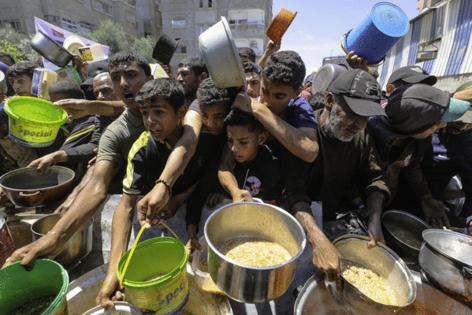Israel-backed Gaza food aid plan dogged by delay and dissent
Published in News & Features
A contested plan backed by the U.S. and Israel to deliver food to Palestinians in the Gaza Strip is off to a rocky start, with the top organizer resigning and the roll-out dogged by delay.
The Gaza Humanitarian Foundation (GHF), a new Swiss-based nonprofit, opened one distribution station in a southern buffer zone on Monday, a day behind schedule, Israeli officials said. But there was no immediate indication that hand-outs were under way.
The ruined coastal enclave’s more than 2 million civilians have been brought to the brink of famine, relief agencies say, by an Israeli aid blockade imposed in March after the last truce with Hamas expired.
Israel has mounted what Prime Minister Benjamin Netanyahu describes as the final push to win the more than 19-month-old war. Tanks and troops are under orders to conquer Gaza, rout Hamas holdouts, move civilians toward the southern buffer zone and recover the remaining 58 hostages held by the Iran-backed group.
On Monday, the military issued evacuation orders to residents of the southern town of Khan Younis, saying Hamas targets would be engaged there. Israeli strikes killed at least 52 people the same day, the Associated Press reported, citing local health officials.
Whether the 20 hostages believed to be alive will survive the new sweep is a question wracking Israelis, most of whom, according to surveys, want to end the war with a negotiated repatriation — even if that leaves Hamas in power. Israeli officials say Qatari- and Egyptian-mediated talks on a deal continue, spurred by the military pressure.
The GHF’s executive director, Jake Wood, resigned late on Sunday citing misgivings about the plan. Still, the GHF said that by week’s end it would have two more distribution stations in the southern buffer zone and another in central Gaza, for an operating volume sufficient to feed 1 million people. It hopes to expand operations and reach others eventually.
The GHF operation was held up, said Eli Cohen, Israel’s energy minister and a security Cabinet member. “This was meant to begin yesterday — the 25th — but that didn’t happen,” he told Army Radio.
U.N. agencies have voiced concern that a limited resumption of food distribution would be insufficient, push civilians into small areas and politicize aid.
Israel’s strategy is drawing increasing global censure, angering its allies in Europe and isolating it in international forums.
The GHF has said it offers “a pragmatic plan that is able to immediately get aid into Gaza under the conditions as they exist today,” and deemed “no longer viable” the United Nations-led mechanism that was in place for decades before Hamas triggered the war by invading Israel on Oct. 7, 2023.
Hamas warned Gazans it would “take necessary measures” against any who avail themselves of the distribution centers.
Officials have said that the Israeli military would guard the periphery of the sites while U.S. contractors provide security. Recipients will be the heads of Palestinian households, vetted to ensure they are not members of Hamas, and given provisions to last each family a week. Concerns have been raised over how onerous carrying the rations long distances could prove to those already weak from hunger. But the plan aims to limit the chances of Hamas operatives seizing truckloads, Israel has said.
In his resignation letter, Wood said: “It is not possible to implement this plan while also strictly adhering to the humanitarian principles of humanity, neutrality, impartiality, and independence.”
Cohen, the energy minister, said Israel had rejected an offer for 10 hostages to be released over the course of a two-month ceasefire. Israel backs a proposal by U.S. envoy Steve Witkoff under which half of the living hostages would be freed immediately, and the return of the rest and ending the war would be discussed in the ensuing 45- to 60-day truce, Cohen said.
Israel wants Hamas toppled and disarmed and its leaders exiled. Hamas has signaled it could give up Gaza governance, but not its arsenal.
Hamas, designated a terrorist organization by the U.S. and the European Union, killed 1,200 people and took 250 hostages in the Oct. 7 assault. Israel’s offensive has killed more than 53,000 people in Gaza, according to the Palestinian territory’s Hamas-run health ministry. Israel has lost more than 400 troops in Gaza combat.
--------
—With assistance from Marissa Newman.
___
©2025 Bloomberg L.P. Visit bloomberg.com. Distributed by Tribune Content Agency, LLC.







Comments